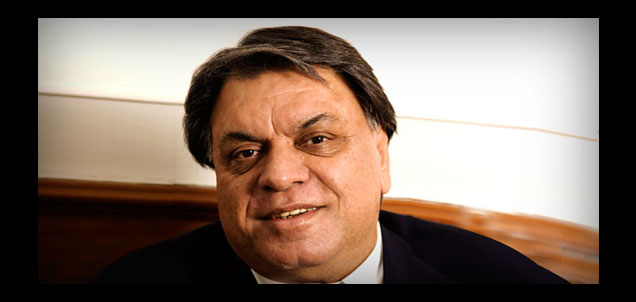
Anil Kapoor, Chairman Emeritus at FCB Ulka, passed away in Mumbai on Monday. He was 73. Many of those who worked with him closely were in a deep sense of shock. Here’s a tribute from a former colleague-turned-friend
By Ashoke Agarrwal
Anil Kapoor, a doyen of Indian advertising, passed away yesterday.
I worked with Anil Kapoor in the nineties in two short spells of three years each. Even so, in my three decades in advertising, I have considered Anil as my only mentor.
Though Anil started his career as a junior accounts man in advertising, he moved away to marketing, serving a long stint with Boots in the eighties ending up as head of marketing. He took over the reins of Ulka in the nineties as the legend of Indian advertising and founder of Ulka, Bal Mundkur, was beginning to contemplate retirement.
By the time Anil himself retired a few years ago, he had not only consolidated Ulka’s position as one among the Top 5 in a rapidly growing sector but created and nurtured Ulka as a school of advertising that was all it’s own.
In my second stint at Ulka, Anil sometimes used to talk about his plans for the future. He used to muse about founding an institution located somewhere in the hills that would train youngsters in the science and art of advertising.
Even though he never got around to starting an academic institution, today, scores of the most successful practitioners in Indian advertising and consumer marketing would acknowledge that their years of working with Anil at Ulka gifted them a unique foundation.
What was it that put Anil apart from all other heads of advertising agencies?
To my mind, it was in the uniqueness that he cultivated in Ulka’s relationship with its clients. Anil did not believe in the maxim of “the client is always right”, so standard among most advertising people and agencies worldwide.
Most other agencies rarely questioned the client’s brief and then strove to create advertising that the client deemed to be on brief.
On the other hand, Anil started with rigorously interrogating the client’s brief, which was equally central to Ulka’s process as the actual creative development of advertising.
The principle that Anil believed in was that the agency served the brand and the client’s marketing team was the agency’s partner and not its boss in building the brand.
The agency people he worked with him when he was on the other side of the table at Boots acknowledge that he was true to this principle even then.
How did Anil and Ulka manage to practice this unique approach to advertising while growing Ulka into a powerhouse agency in the nineties’ go-go years?
It was because Anil had the chops. He had a strategic mind well-versed in the ins and outs of business and marketing. That’s why clients were willing to listen when he argued and debated with them about their business and marketing strategy.
Not only did he have the chops, but he built and nurtured a senior team around him that had the chops. Many of the A-team in Ulka had either like him spent years in sales and marketing or displayed the strategic skills to dissect and debate a client’s brief.
He took this approach even deeper within Ulka. Ulka was the only agency that every year recruited a management trainee crop from the best business schools and put them through a rigorous orientation schedule which included month’s spent trudging the market as part of the client’s sales teams.
Many of Ulka’s detractors believed that Ulka, with its unique approach, was all strategy and little creative. Far from the truth. Within the agency. Anil spent most of his time in the creative development process. His approach to creative development was methodical. He would insist that the creative development process evaluated all the possible alternatives before zeroing in on one or two to take further. That frustrated some creative types who believed that true creativity was in the leap that brooked no interference—resulting in a few angry departures from the senior creative ranks and a lot of bad-mouthing.
Nevertheless, Ulka did produce some seminal advertising that managed to be strategic and creative in equal parts. For example, for those of you old enough to remember, Ulka’s campaigns for Santoor, Sundrop, Ceat, Amul and Hero Honda built brands while breaking new creative ground.
I left Ulka before it became part of FCB, a leading international agency. However, my connection with Anil and Ulka remained deep, regularly meeting them and being close friends with some of them. From what I heard from Anil and his senior team, he continued to push his approach to advertising with his international counterparts, earning a unique place in their top ranks and ending up on the mother company’s board.
Anil retired when he came down with a severe illness a few years ago. He fought and defeated it and continued to live a full life flitting between Singapore and Mumbai.
Whenever I met him, he expressed sadness at the turn the advertising business had taken not just in India but across the world. He had fought hard to earn Ulka a place at the high table of marketing. Today, he saw that advertising, in general, had lost its self-respect toadying up to the whims of brand managers. As a result, very few of the best people joined advertising, and it had, by and large, become the refuge of mediocrity.
How would Anil have responded to the digital onslaught and the emergence of soulless adtech, performance marketing and Big Data? I believe a younger Anil Kapoor would have managed to fight the paradigm and earn a unique place for himself and his agency. Perhaps there is somewhere a young Anil Kapoor doing so. Meanwhile, Anil, wherever he is now, is probably busy shaking up the establishment.
 Ashoke Agarrwal ran account planning at Ulka for a few years during Anil Kapoor’s tenure there. With around four decades in advertising and marketing services, Agarrwal, a chemical engineer from IIT Mumbai and a postgraduate from IIM Bangalore, is a pro-entrepreneur with past and current ventures in market research, advertising, CGI, e-learning and brand consultancy.
Ashoke Agarrwal ran account planning at Ulka for a few years during Anil Kapoor’s tenure there. With around four decades in advertising and marketing services, Agarrwal, a chemical engineer from IIT Mumbai and a postgraduate from IIM Bangalore, is a pro-entrepreneur with past and current ventures in market research, advertising, CGI, e-learning and brand consultancy.